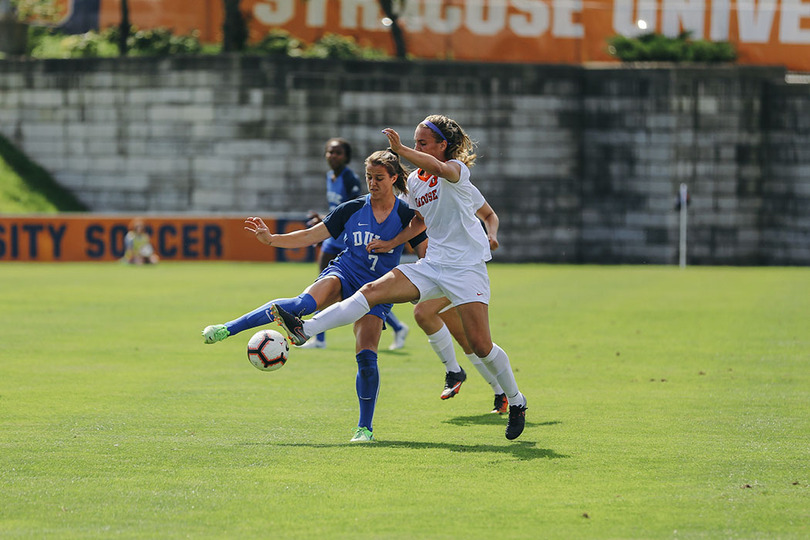Fouls are piling up on struggling Syracuse

Syracuse has outfouled its opponents this season, 79-54, and the Orange has won three of its first nine games. Josh Shub-Seltzer | Staff Photographer
Freshman defender Jenna Tivnan had already allowed Duke’s Kayla McCoy behind her. To prevent a breakaway chance, Tivnan’s only option was to recover back and slash McCoy across the shins. She earned a yellow card.
The coaches on Duke’s sideline lobbied for Tivnan to be kicked out of the game. She wasn’t, and the play prevented a free shot at the net.
“I had to foul her, otherwise she would’ve gotten a goal,” Tivnan said after the game.
Syracuse (3-6, 0-1 Atlantic Coast) has committed as many or more fouls than the opposing team in seven of its nine games. On the season, the Orange have out-fouled opponents 79-54 for an average of 8.8 fouls per game. It came to a breaking point against Colgate, when Syracuse committed 17 fouls in the 3-1 loss on Sept. 9.
“If the team is fouling 17 times, I’m happy,” head coach Phil Wheddon said. “That means we’re putting in a physical effort … If the team is playing physically, that’s something I’m OK with because we’re going to have to compete in the ACC. It’s a fast, athletic game.”
During the Orange’s four-game losing streak, in which it’s been outscored 13-2, SU has earned five yellow cards and out-fouled opponents, 43-23.

Susie Teuscher| Digital Design Editor
SU defender Abby Jonathan said there are two appropriate times to intentionally foul: Giving away a penalty kick to stop a clear scoring chance or stopping a counterattack at midfield when the opponent has a clear path into the defensive end.
Unnecessary fouling leads to set pieces, penalty kicks and goals, freshman center back Jonathan said. Similar to Tivnan, Jonathan tried to prevent a goal by fouling against Harvard, but her foul rewarded the Crimson with a penalty kick goal.
“Obviously when the ball is coming close to the goal, people start panicking because they want to get the ball out (of this area),” goalkeeper Lysianne Proulx said. “But sometimes it’s just better to try not to win it and just put your body in front of it and just try to cut the angles.”
Often, an SU player will be a step late to a play or will stab at the ball instead of containing. Wheddon wants his team to play physically, but he does not condone “malicious” fouling, he said.
“Sometimes a player is going to stick a foot out to try and win the ball and it’s about timing,” Wheddon said. “She might arrive late or the player might take a touch past her and she might try and reach for the ball and bring a player down.”
In games when Syracuse has fallen behind, SU tends to foul more often. Against Duke, SU recorded more than half of its nine total fouls after falling behind 2-0.
Wheddon said penalties are “part of the game” and can be used to “gain a tactical advantage.”
“If they’re already going to score, you might as well make it a 50-50 chance instead of just letting in a goal,” Jonathan said. “But a lot of time, you shouldn’t let up a PK, you should do your best to win the ball.”






